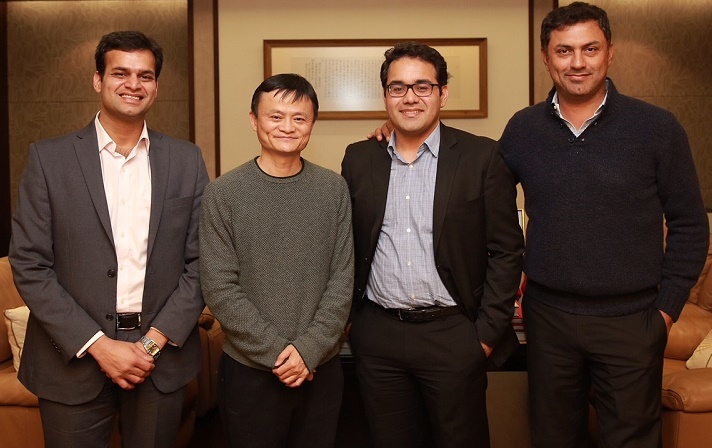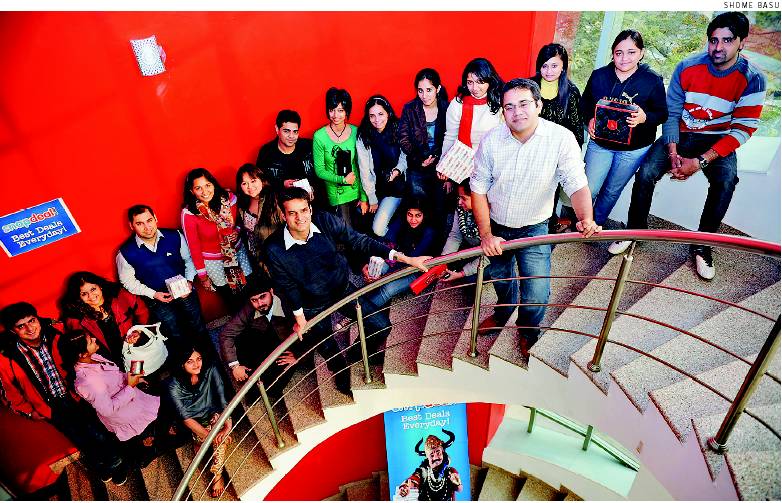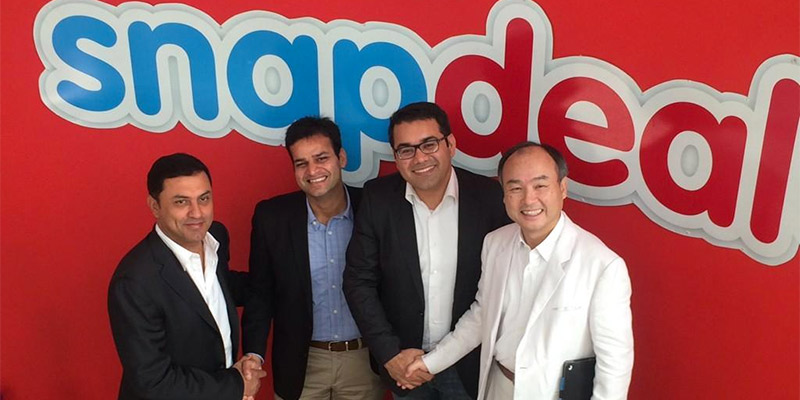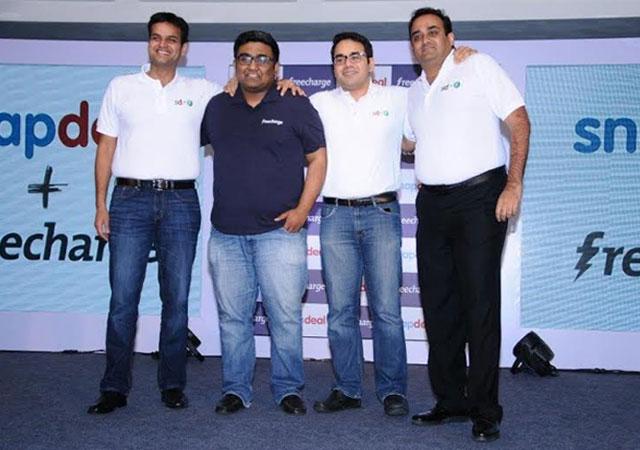Quick Facts:
Name: Snapdeal
Founded: 2010
Founder: Kunal Bahl, Rohit Bansal
CEO: Kunal Bahl
Industry: E-commerce
Sector: Public
Country: India
Website: www.snapdeal.com
The Idea Behind Snapdeal!!
E-commerce is one of the greatest boons of the internet era. It has simplified lives which have been ridden by hectic work schedules and the almost impassable commuting situations. Think of anything under the sun and it shall be yours in just a few clicks, without having to wait in long queues and resultantly evade the prying eyes of store managers. All this and more from the comfort of your home (or office)! With internet foraying into areas far and wide, online shopping or e-tailing is slowly replacing conventional shopping. The number of E-commerce companies mushrooming every day is a glowing proof of this. However few make the mark while others perish under the stress. The story of Snapdeal founders who have forged their startup to morph it into one of the India’s largest online marketplace is an inspiring and hopefully it will motivate others to find their niche in the world of cut-throat competition. Now, Hop on to the entrepreneur bandwagon.
The Beginning….
Snapdeal was the brainchild of Kunal Bahl, a Jerome Fisher Program in Management and Technology graduate from University of Pennsylvania, and Rohit Bansal an IIT Delhi baccalaureate. The duo’s collaboration began in 2007-08 when they pitched in resources to start MoneySaver, an offline couponing business. The venture took off with a good start and 15000 coupons were sold in less than a quarter of a year.
Their vision!!
It was the time when internet penetration in the country was in its nascent stages that they envisioned plans to expand the business, but funds were needed. Herein came IndoUS Venture Partners, who invested in their vision. Their first meeting with Vani Kola, MD of IndoUS did not go as expected but she decided to trust her gut feeling and after a few more interactions, she came aboard. Vani has since then been closely integrated with the running of the company and the Snapdeal founders give her immense credit for her support.
After an initial round of funding from Indo-US in September 2009, Snapdeal was finally launched in January 2010. The company was based out of an office in New Delhi. Heeding advice from a few merchants, Kunal and Rohit decided to delve into the online platform. After several sessions of brainstorming, on February 4, 2010, Snapdeal.com opened to the public. It was a period of trial and error but the founding partners never lost hope. They worked diligently to fix the issues and perused every scope for improvement.

Photo Credit:
http://yourstory.com/2015/08/snapdeal-snaps-500-million-round-led-alibaba-foxconn-softbank/
The Business Model They Adopted:
When they jumped into the ecommerce bandwagon, it was commonplace to use physical warehouses for stocking goods and providing them to consumers. It was in 2011, that they came across the “asset light’ business model employed by Alibaba, another emerging online business. Instead of handling goods, they just provided a digital platform where sellers and buyers can interact; it reduced the inventory expenses significantly and in return they gained certain profit margins for every sale.
It was a big risk but they decided to scrap the deals project and focus on an online merchandise portal on the lines of Alibaba. The journey to become India’s largest online marketplace was marked with the bitter-sweet pill of tribulations and success and the dynamic duo worked with agility to better their standards of service. In just matter of two years the team of 30 grew to 1500 and Snapdeal now religiously follows several creative approaches to ensure employee enablement and satisfaction. Vani has been instrumental in this field too; her mentorship helped the budding entrepreneurs handle such a momentously growing team efficiently. The team, according to the founders, is the reason they were able to rope in more than 2000 sellers in 6 months.

Photo Credit:
http://epaper.timesofindia.com/Repository/getFiles.asp?Style=OliveXLib:LowLevelEntityToPrint_ETNEW&Type=text/html&Locale=english-skin-custom&Path=ETBG/2011/12/25&ID=Ar01200
Who Funded Their Vision?
Over the years with experience, Kunal and Rohit realized that in a booming economy such as India’s, it is best to work backwards in the supply chain. The key they believe is to assess customer’s needs and then work around it. E-commerce is synonymous to convenience, and what differentiates an online platform from others is its reach and the assortment or range of goods they provide. Snapdeal since its inception has strived to work towards this goal. It has been rapidly expanding its reach to over 5000+ cities and towns in the country with over 12 million products from more than 150,000 sellers.
The initial response from the customers and due diligence from the founding duo bolstered the faith of investors in the company. Apart from the initial funding from $12 million from Nexus Venture Partners and Indo-US Venture Partners, Snapdeal also received a second round of funding of $45 million from Bessemer Venture Partners and the existing investors in July 2011. It was evident to the entrepreneur world that Snapdeal is here to stay when e-commerce giant eBay invested in the company. It was a win-win deal for Snapdeal as along with the $50 million funding they also had access to the vast expertise of the online marketplace giant. In Feb 2014, eBay and other existing investors along with Intel Capital and Saama Capital invested an additional $133 million in the company. The 5th round of funding came in May 2014 when PremjiInvest, American global investment company Blackrock, and Government of Singapore owned Temasek Holdings, invested $105 million. This investment enabled Snapdeal to become the member of the coveted billion dollar club.

Photo Credit:
http://yourstory.com/2014/10/snapdeal-funding-softbank-group/
Softbank, the primary backer of Alibaba also became the largest investor in the Indian ecommerce giant when it invested $647 million in fresh capital in Oct 2014. In Aug 2015, Snapdeal raised $500 million in fresh capital from SoftBank, Alibaba Group and the Taiwanese electronics contract manufacturing company Foxconn. Other investors in the Indian online ecommerce venture are Ontario Teachers’ Pension Plan, one of the largest pension funds across the globe and Brother Fortune Apparel, a Singapore based investment firm.
Acquisitions:
Apart from focusing on customer satisfaction and providing a wide array of goods on their portal, the e-commerce player also focused on expanding their business in the M-commerce (mobile commerce) arena. The company has made several strategic acquisitions to reinforce their objective. Grabbon.com the buying site was acquired in June 2011, followed by esportsbuy.com, an online sports retailer which was purchased in April 2012. Shopo.in, a portal for Indian handicrafts products was procured in May the following year and the accession of Doozton.com took place in April 2014. In December the same year Wishpicker.com (website for gift recommendation) was acquired, followed by Smartprix.com (product comparison website) in January 2015. February witnessed the accession of Exclusively.in and in March Snapdeal acquired a 20% stake in Gojavas.com, a logistics service provider. The ecommerce company is currently a 50% stakeholder in Gojavas. In tow came the procurement of Unicommerce.com, a company which provided software solutions for ecommerce management. They branched out into the financial services sector by the acquisition of RupeePower in March 2015. With the accession of FreeCharge.com, in April 2015 Snapdeal became one of the biggest M-commerce companies in India. The latest acquisitions were a Silicon Valley startup Reduce Data and LetsGoMo Labs which will inevitably play a vital role in improving the M-commerce platform for Snapdeal.

Photo Credit:
http://www.vccircle.com/news/technology/2015/04/08/snapdeal-acquires-freecharge-build-larger-play-mobile-commerce
Net Worth:
At the behest of such investments and acquisitions and an 8.5 per cent share in the e-commerce company, their net worth collectively stands at a whopping $145 million as of 2015 whereas the company’s net worth stands at a whopping $ 874,000,000.
What Separates Them From The Rest?
Constant innovation is the key to achieving success in the E-commerce business believes the Snapdeal CEO and the decision to introduce flexibility in payment by enabling customers to pay with credit or debit cards on delivery is a step in that direction. The plan was rolled out initially in metros and is slowly expanding to 200 odd-cities.
The Snapdeal founder’s advice budding entrepreneurs was that money should not be the motivating factor for starting a business and having a mindset to make a difference in the society is crucial for the success of the business.
A village in Muzaffarnagar, Uttar Pradesh bears testament to the philanthropic side of the company. In June 2011, the residents of Shiv Nagar village unanimously decided to rename their settlement as “Snapdeal.com Nagar” as a token of gratitude for the ecommerce company for installing 15 hand pumps.
Challenges Faced By Snapdeal…
The customer base for online companies’ increases hand in hand with internet penetration in the country and the potential for growth is tremendous. Companies are offering heavy discounts and other incentives to lure customers thus incurring loses. It is a matter of concern as fresh funds will be needed to cover the losses but Kunal believes it is going to pay off in the long run.
The age old ‘word of mouth’ is of paramount importance in making Snapdeal a brand that it is today. However one incident of malicious intent can spoil years of backbreaking work in this industry. The netizens went on an endless rant about the customer who once was delivered stones instead of the phone he had ordered. Also, the company drew a lot of flak from customers when their brand ambassador Aamir Khan made remarks about the nation being intolerant. However instead of focusing on the bad, the company continues to work towards providing their customers with the ‘Dil ki Deal’.

Photo Credit:
http://www.india.com/stream/aamir-khan-snapdeal-ad-what-will-be-your-dil-ki-baat-328196/
Interview With Kunal Bahl Of Snapdeal
Part 1
Part 2
https://www.youtube.com/watch?v=0twOeTQI4cs
Part 3
https://www.youtube.com/watch?v=jBRYTO7J6oI
Part 4
https://www.youtube.com/watch?v=aRT11qJ9wVg
Snapdeal’s Kunal Bahl: Creating a ‘Discovery Platform’ for Indian Consumers
https://www.youtube.com/watch?v=0yN8sWfuu9E






